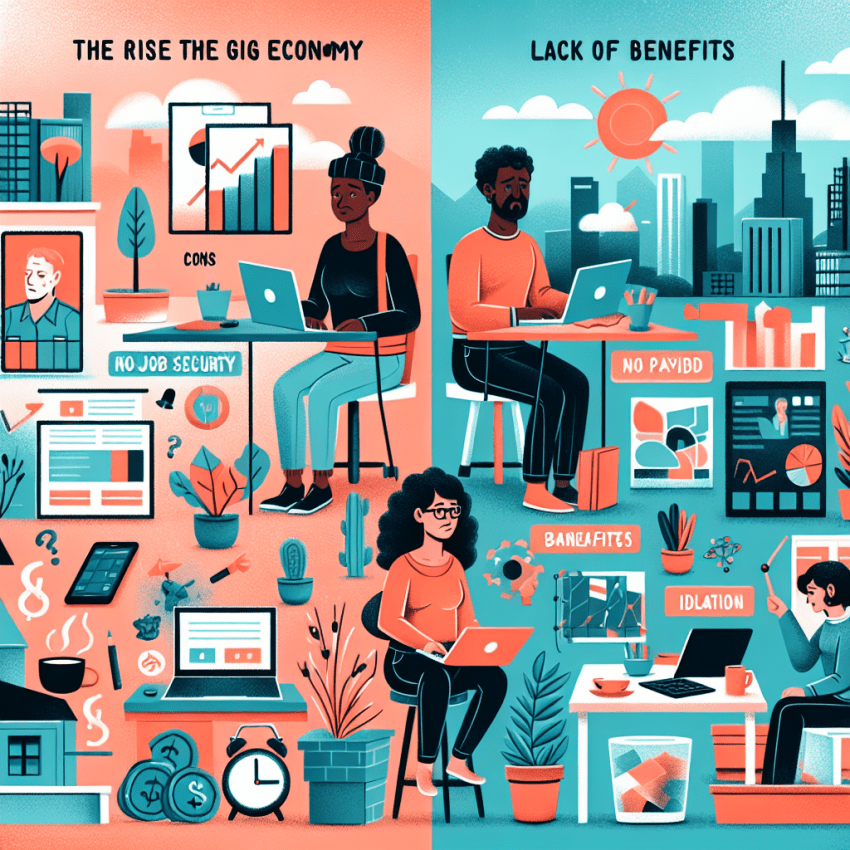The Rise of the Gig Economy: Pros and Cons of Freelance Work
In recent years, the gig economy has surged, creating a flexible, dynamic landscape for freelancers worldwide. Whether you’re a designer, writer, programmer, or even a jack-of-all-trades, the gig economy offers numerous opportunities. But with great flexibility comes great responsibility—or something like that. Let’s dive into the pros and cons of freelance work to help you decide if the gig economy is your cup of tea. Spoiler alert: It may involve lots of coffee.
Pros of Freelance Work
Freelancing can be a dream come true for many, offering perks that traditional jobs may lack. Here are some of the notable advantages:
- Flexibility: One of the most appealing aspects of the gig economy is the flexibility it offers. You get to set your own hours, work from anywhere, and choose projects that excite you. If being a night owl is your style, freelancing fits perfectly.
- Variety: Freelancers have the opportunity to work on a variety of projects for different clients. This can make your work life more interesting and diverse, keeping boredom at bay. You could be designing a website one week and writing a blog post the next—talk about keeping things fresh!
- Potential Earnings: Depending on your skill set and industry, freelance work can be quite lucrative. Highly skilled freelancers often find that they can charge more per hour than they would receive in a salaried position.
- Independence: Say goodbye to micromanaging bosses! As a freelancer, you’re your own boss. You make the decisions about which projects to take on and what your workspace will look like—cue the image of working in PJs on the couch.
- Skill Development: Freelancing provides a great avenue for continuous learning and improvement. You get hands-on experience with different tools and techniques, and the need to market yourself hones your business skills.
Cons of Freelance Work
Before you dust off your laptop and dive headlong into freelancing, it’s essential to consider the potential downsides. Here are some challenges you might face:
- Income Instability: Unlike a salaried position, freelance income can be inconsistent. One month you might be raking in the dough, while the next month you could be tightening your belt. Budgeting becomes more crucial than ever.
- Isolation: Freelancing often means working alone, which can lead to feelings of isolation. The office banter and spontaneous coffee breaks are replaced by solo lunches and chats with your cat—if you have one.
- Work-Life Balance: Without set working hours, it can be hard to separate work from personal time. You might find yourself answering emails at midnight or working through weekends, making it challenging to maintain a healthy work-life balance.
- No Benefits: Freelancers don’t get the perks that come with traditional employment, such as health insurance, retirement plans, or paid vacation days. These are things you’ll need to manage independently.
- Self-Motivation Required: Being your own boss is fantastic, but it also means you need to be highly self-motivated and disciplined. There’s no one to hold you accountable, and procrastination can be a real productivity killer.
Finding Balance: Resources for Freelancers
Striking a balance between the pros and cons of freelancing can be tricky, but there are numerous resources available to help. One effective way to stay updated and connected within the freelance community is by following Top Work Telegram Channels. These channels offer valuable insights, job opportunities, and career advice, helping you navigate the highs and lows of freelance life.
If you’re considering diving into the gig economy, know that it’s a journey of ups and downs. The key is to stay informed, connected, and adaptable. Whether you’re drawn to the flexibility and variety or wary of the instability and isolation, understanding both sides will help you make the most of your freelance career. Now, if you’ll excuse me, I have to go negotiate a raise with myself. Wish me luck!
Stay gig-positive, future freelancers! 🌟
